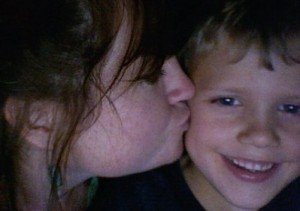 My 14 year old son has FASD, diagnosed when he was 9. Once he was diagnosed and we started learning about FASD, brain damage, and how the brain controls behavior, everything changed. It’s been a time of intense research and extreme growth for our family. We’ve gone from a family in crisis to a family that’s just mildly dysfunctional! There’s happiness and laughter in our house again. Our child has changed from a constantly angry, frustrated, and misunderstood boy to one who is content, proud of his accomplishments, and accepted for who he is. This is all through understanding FASD as brain dysfunction, recognizing problem behaviors as clues to a poor fit in our child’s environment, and realizing that our child’s physical disability (because the brain is part of the body, right?) needs and deserves accommodations, just as we’d accommodate anyone else with a physical disability.
My 14 year old son has FASD, diagnosed when he was 9. Once he was diagnosed and we started learning about FASD, brain damage, and how the brain controls behavior, everything changed. It’s been a time of intense research and extreme growth for our family. We’ve gone from a family in crisis to a family that’s just mildly dysfunctional! There’s happiness and laughter in our house again. Our child has changed from a constantly angry, frustrated, and misunderstood boy to one who is content, proud of his accomplishments, and accepted for who he is. This is all through understanding FASD as brain dysfunction, recognizing problem behaviors as clues to a poor fit in our child’s environment, and realizing that our child’s physical disability (because the brain is part of the body, right?) needs and deserves accommodations, just as we’d accommodate anyone else with a physical disability.
Our story is pretty common among parents of kids with FA: when he was young – preschool age – we knew something was not right, and doctors agreed with us, diagnosing him with ADHD, ODD, Sensory Processing Disorder, mood disorder, and various learning disabilities. At every doctor’s appointment (and we went to MANY doctors) I’d mention that he was exposed to alcohol in utero, and every doctor would shrug and say that it could be the cause, but the cause didn’t matter. It was the behavior that needed to be changed.
School was a nightmare and home was no better: every day we’d experience raging, screaming, an opposition. We tried every parenting technique out there, read every book. There was no change. We were convinced that something really bad would happen eventually. He would escalate, become more violent, break the law, or something equally terrible. But then finally, our current psychiatrist suggested we take him to an FASD clinic for diagnosis. While we were waiting for our appointment, we went to a short workshop on FASD and our eyes were opened. Our child wasn’t purposefully ignoring us when we asked him something and he didn’t respond: his brain processed slower, so he needed a minute or two to understand what we were saying. He wasn’t “acting” like a baby – his development was slower, so while he was 9, “acting” like a toddler, it wasn’t an “act.” Developmentally he was a toddler. The screaming and aggression were all symptoms of his frustration – not purposeful acts of aggression, designed to make our lives miserable.
It was an enormous change in perception. A paradigm shift. And it was the beginning of making our family whole again.
My approach to FASD education is very personal, but also born from years of research. I’ve studied with Diane Malbin, an internationally recognized expert in the brain-based approach to FASD, and I integrate what I learned through participation in her Train the Trainer program with independent research and many, many anecdotes from my own life as well as those of families who’ve generously shared with me over the years.
The training can be done in a number of different formats: 3 hours, 1 day, 2 days, 3 days, or 8 2-hour sessions at a time. I am located in western Massachusetts but travel often for trainings. If you are interested in receiving my C.V. and an outline of the goals, objectives, and agenda for training, please contact me at adrienne@fafasd.org.
For a schedule of upcoming in-person and webinar trainings please see the FAFASD website.
Contact
Find me online:
Easy to Love but Hard to Raise Families Affected by Fetal Alcohol Spectrum Disorder





